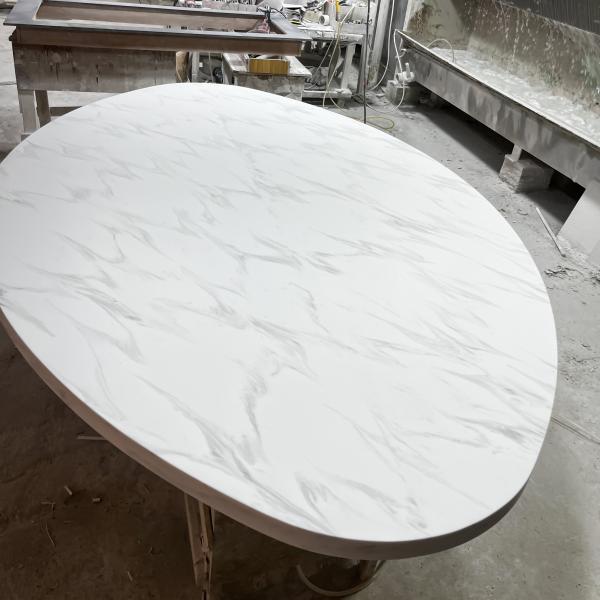
 Artificial stone countertops are a synthetic countertop material, usually composed of polymer resin, pigments and natural stone powder. Engineered stone countertops are more uniform and provide more design flexibility than natural stone. Not only do they look great, they are also durable, easy to clean, and water and stain resistant. Engineered stone countertops are also more environmentally friendly because they can utilize recycled materials in their manufacturing process and produce less waste. They can also be customized into various shapes and sizes as needed to meet the needs of different spaces. Overall, engineered stone countertops are a popular choice that can bring a high-end look and performance to a home while also reducing maintenance costs and effort.
Artificial stone countertops are a synthetic countertop material, usually composed of polymer resin, pigments and natural stone powder. Engineered stone countertops are more uniform and provide more design flexibility than natural stone. Not only do they look great, they are also durable, easy to clean, and water and stain resistant. Engineered stone countertops are also more environmentally friendly because they can utilize recycled materials in their manufacturing process and produce less waste. They can also be customized into various shapes and sizes as needed to meet the needs of different spaces. Overall, engineered stone countertops are a popular choice that can bring a high-end look and performance to a home while also reducing maintenance costs and effort.
Features:
Aesthetics: Provides a variety of color and texture options, which can imitate the appearance of natural stone and have a more uniform texture, making the overall decoration more coordinated.
Durability: It has strong wear resistance and scratch resistance, is not easily damaged or deformed, and can withstand long-term use without losing its beauty.
Easy to clean: The surface is smooth and non-porous, not easy for stains to penetrate, easy to clean, just use a mild detergent and a damp cloth to restore the shine.
Antibacterial: Due to the smooth surface, it is not easy to breed bacteria and mold, helping to maintain a hygienic environment in the kitchen and bathroom.
Environmental protection: Recycled materials can be used in the manufacturing process, reducing the consumption of natural resources, and less waste production helps reduce the environmental burden.
Adaptability: Can be customized into various shapes and sizes to meet the needs of different spaces, and can also be seamlessly integrated with other materials to provide more flexible design options.
Mild properties: Not easily affected by temperature changes, able to resist heat, not easily affected by thermal expansion and contraction, and maintain stable surface properties.
Artificial stone countertop manufacturing process
Material preparation: Prepare the required raw materials according to a certain proportion, including polymer resin, natural stone powder, pigments, etc.
Mixing: Put the prepared raw materials into the mixer and mix to ensure that the various ingredients are evenly distributed.
Pressing: Pour the mixed material into a mold and press it through a press to give it the desired shape and size.
Curing: Place the formed countertop in the curing chamber, and after a certain period of curing and hardening process, its surface becomes hard and smooth.
Surface treatment: The cured countertop needs surface treatment, including grinding, polishing and other processes, to ensure its smooth appearance.
Inspection: Finally, quality inspection is conducted on the finished countertop to ensure that it meets relevant standards and requirements.
Applications include:
Kitchen countertops: Artificial stone countertops are widely used in kitchens. Its wear resistance and easy cleaning properties make it an ideal kitchen countertop material.
Bathroom Countertops: Engineered stone countertops are also commonly found on bathroom sinks and vanity tops, and their antibacterial properties help keep bathrooms clean and hygienic.
Restaurant countertops: Artificial stone countertops are also commonly used in commercial places such as restaurants and cafes. Its beauty and durability provide customers with a comfortable dining environment.
Office countertops: Artificial stone countertops are often used for countertop decoration in offices and commercial spaces. Its high-end and elegant appearance can enhance the grade of the entire space.
FAQ:
What is an engineered stone Solid countertop?
Artificial stone solid countertop is a countertop made of synthetic materials, usually composed of polymer resin, pigments and natural stone powder.
What are the advantages of artificial Stone Solid Countertops?
They have the advantages of beauty, durability, easy cleaning, antibacterial properties, environmental protection and adaptability.
What is the difference between engineered stone solid countertops compared to natural stone?
Artificial stone solid countertops are more consistent, offer more design flexibility, and are more environmentally friendly.
How diverse are the color and texture options for engineered stone solid countertops?
They offer a variety of color and texture options that mimic the look of natural stone with a more uniform and consistent texture.
How to clean artificial stone solid countertops?
Since its surface is smooth and non-porous, cleaning is as easy as using a mild detergent and a damp cloth.
Can Engineered Stone Solid Countertops Resist Heat?
Yes, they are generally resistant to heat and are not susceptible to thermal expansion and contraction, maintaining stable surface properties.
Is the process of manufacturing engineered stone solid countertops environmentally friendly?
Yes, artificial stone countertops are more environmentally friendly because recycled materials can be used in the manufacturing process and less waste is produced.
Where are artificial stone solid countertops common?
They are commonly found on kitchen and bathroom countertops, cabinet fronts, and renovation projects in commercial locations.
Are artificial stone solid countertops customizable?
Yes, they can be customized into various shapes and sizes to meet the needs of different spaces and can be seamlessly integrated with other materials.
How much does artificial stone solid countertops cost?
Prices vary based on brand, quality, color and size, but are generally more affordable than natural stone countertops.